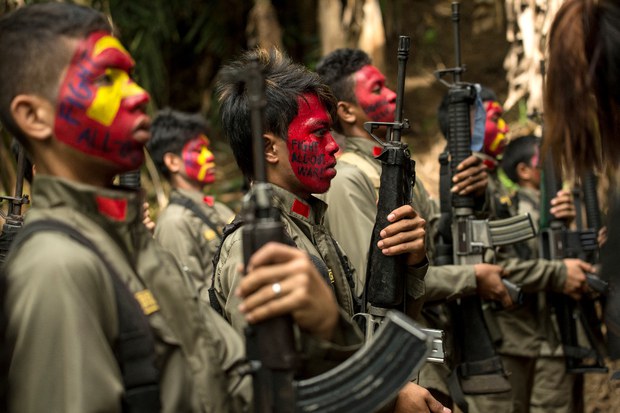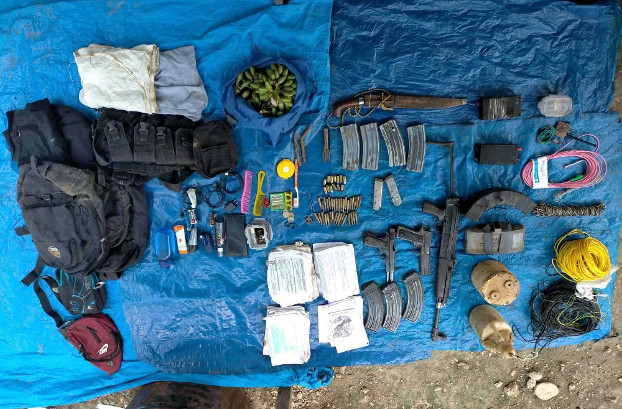Philippine Military: 12-Year-Old among 3 Killed in Clash with Suspected Communist Rebels
2021.06.17
Cagayan de Oro, Philippines
 New People’s Army guerrillas stand in formation in the Philippines’ Sierra Madre mountain range east of Manila, July 30, 2017.
New People’s Army guerrillas stand in formation in the Philippines’ Sierra Madre mountain range east of Manila, July 30, 2017.
A 12-year-old girl was among three communist guerrilla suspects killed in a clash earlier this week in the south, the Philippine military said on Thursday, about an incident that drew condemnation from rights groups.
Separately, a congresswoman in the United States introduced an act to suspend U.S. assistance to Philippine security forces, in response, she said “to the mass human rights violations perpetuated by the [Rodrigo] Duterte regime."
Meanwhile, army Brig. Gen. Allan D. Hambala said troops did not see the child among the suspects involved in the clash that occurred near the remote town of Lianga in Surigao del Sur province on Tuesday.
“Once the firing started it was all go. The terrain was covered with thick jungle foliage,” Hambala said.
In a report, the military said the clash began when a group of suspected New People’s Army (NPA) members fired at the troops and detonated an anti-personnel mine.
The 10-minute firefight “led to the death of three NPA members identified as Lenie Perez Rivas, 38, Willy Salinas Rodriguez, 20, and a 12-year-old girl,” the military said, withholding the name of the child.
Hambala said soldiers saw a man firing at them, prompting the 12-man special forces team to retaliate. The encounter occurred near a jungle trail beside an old logging road, he said.
Soldiers found the girl’s body during a search after the clash. They also recovered an AK-47 rifle, two .45-caliber pistols, backpacks, ammunition and two anti-personnel mines near the three slain suspects, Hambala said.
A day before Tuesday’s clash, the special forces team was involved in a similar encounter with 20 NPA rebel suspects in nearby Agusan del Sur, Hambala said.
Security forces arrested a 15-year-old girl after this clash, who tipped off the troops about the location of the group targeted a day later, according to Hambala.
The military said this was not the first time the NPA had involved child combatants. Data from the military’s Eastern Mindanao Command shows that 12.3 percent of the 1,691 former rebels profiled over the past four years were between the ages of 12 and 17.
The NPA is the armed wing of the Communist Party of the Philippines, which has been waging war since 1969 in one of Asia’s longest-running insurgencies.
Bishop to lead investigation
Rights group Karapatan identified the three killed as members of the local Manobo tribe that has lived in the mineral-rich area for centuries and opposes the influx of outsiders, including mining firms.
Because of this conflict, security forces claim that many tribals are members of the NPA, said Cristina Palabay, Karapatan’s leader.
For instance, Karapatan said that those who were slain were among a group of six farmers who were on their way to town to buy rice. The remaining three were able to escape, and based on its investigation, the group contradicted the military’s claim that there was a firefight.
A fact-finding mission led by Catholic Bishop Raul Dael, who leads the Diocese of Tandag, is expected to conduct an investigation into the incident this weekend.
Hambala said he welcomed an independent investigation and reiterated that the encounter was legitimate and those killed were NPA members
Palabay said Tuesday’s killings were part of a long list of “massacres” carried out under President Rodrigo Duterte’s administration.
“We stand with the people of Lianga with their outrage, their being victims of this bloody rampage against the Lumad people,” Palabay told BenarNews, using the collective term for non-Islamized indigenous groups.
“They look at the Lumad people like hunted prey … falsely tagging the victims as members of the NPA.”
Karapatan, she said, had documented 25 incidents of “massacres” under the current administration, resulting in the death of 121 individuals. In some cases, these killings have been carried out under the cover of Duterte’s drug war, she said.
The government has denied the rights group’s allegations.

Philippine Human Rights Act
Earlier this week, Susan Wild, a member of the U.S. House of Representatives, and 13 co-sponsors reintroduced the Philippine Human Rights Act in congress, saying the Duterte administration is targeting activists, journalists, workers and the clergy.
The bill is described as an effort “to suspend the provision of security assistance to the Philippines until the Government of the Philippines has made certain reforms to the military and police forces, and for other purposes.”
Wild presented a similar bill in the previous congress prior to the 2020 election.
“By blocking assistance to Philippine security forces until such time as human rights standards are met, this bill makes a commonsense proposition: Standing up for human rights requires more than rhetoric. It requires action,” she said in a statement announcing the reintroduction on Tuesday.
A cosponsor, Rep. Hank Johnson, said the bill was needed because of Duterte’s actions.
“We need to show that we do not support tinpot dictators who engage in this kind of oppressive, flagrant form of human rights abuses. Simple reforms could go a long way in helping preserve and strengthen our long-time relationship with Manila,” Johnson said in the statement.
Also this week, Fatou Bensouda, the chief prosecutor at the International Criminal Court in The Hague, asked for the greenlight to investigate the Philippines’ counter-narcotics campaign.
Bensouda, who left the office a day after making her request, said tens of thousands of people may have been victims of extrajudicial killings in the Philippines from mid-2016, when Duterte took office, to March 2019.







